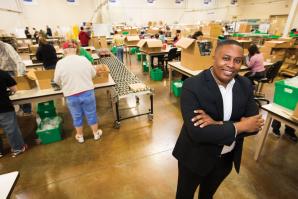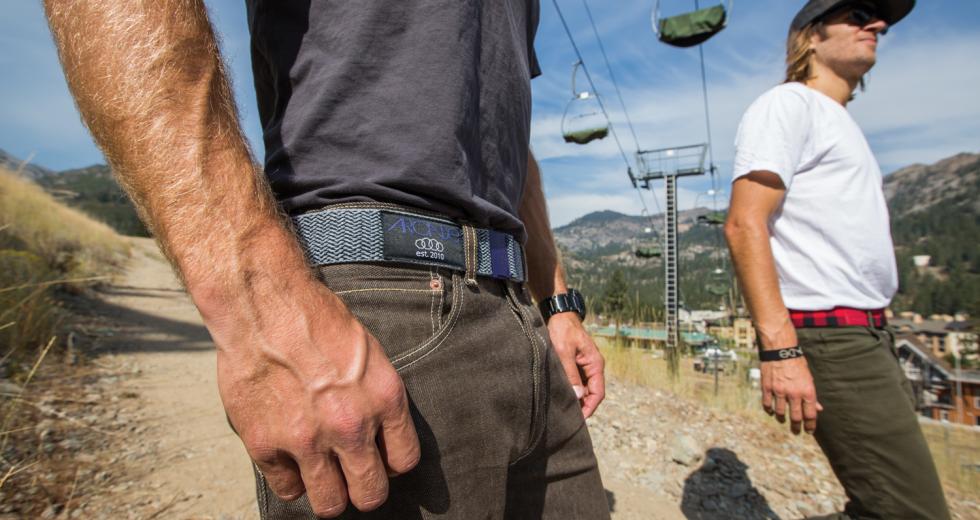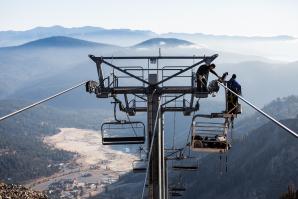A slope-loving trio needed durable, weatherproof belts that would fit comfortably, last a long time and look good. So the self-proclaimed ski bums decided to make their own. Olympic Valley-based Arcade Belts launched three years ago from a living room and specializes in belts made specifically for winter-sport enthusiasts.
Winter weather conditions in Squaw Valley can be brutalizing. Wind-whipped trees and chapped skin come with the territory. And for the skiers and snowboarders who log months — not days — carving up those mountains, their apparel takes a beating.
Cody Townsend, Tristan Queen and David Bronkie ski together regularly and began noticing problems with their mass-produced, activity-generic belts. They just couldn’t stand up to the constant movement and wet conditions.
“We were noticing that no one has made belts built for a specific purpose,” says Townsend, age 30. “I would say 90 percent of the belts you see on the rack have a logo from a company that makes other things.”
The trio needed durable, weatherproof belts that would fit comfortably, last a long time and look good. So the self-proclaimed ski bums decided to make their own. Olympic Valley-based Arcade Belts launched three years ago from a living room and specializes in belts made specifically for winter-sport enthusiasts.
Now, the brainchild of the skiing trio has grown into a full-fledged company with products shipping out to more than 180 stores in seven countries. From the materials to the buckle and iconic style, it’s the first belt brand specifically created for action sports.
“From building a brand and the belt, we’re trying to do something different,” says Queen, 32.
The mountainous backdrop of Squaw Valley served as inspiration for the company owners, who even learned to stitch while sorting out the first 2,000 belts in Townsend’s living room. They strived to make the belts a must-have in the world of action sports.
“This is the industry we wanted to work in,” Queen says. “So, we took it upon ourselves to add our own stamp to something we can bring to the community.”
The name, Arcade Belts, stemmed from Townsend’s family business in the gaming industry, and with the moniker came a flexible design with a stretchy material, snap buckle and washability. The first stock of belts went to a local shop and sold out in seven weeks.
“It was our first real test,” Townsend says. “We had no idea what was going to happen. The fact that they sold out quickly gave us the confidence that we can do this.”
Since Squaw is a winter sports hub, the founders sought retailers through their personal networks. Once they found more local spots to sell the belts, they recruited their first sales representatives, many of them friends or friends of friends. After seeing more success, they branched out even more to recruiting sales representatives at established winter sports apparel brands.
“Our first reps were established within this network, and pitching them off our local sales success and our brand vision got them excited to sign on,” Townsend says. “If there weren’t sales reps we knew in certain territories, we often hit the road ourselves, cold called stores we sought to be featured in and sold the belts ourselves.”
From a handful of shops in Squaw Valley, the company quickly expanded. Arcade Belts are now available in the United States, Canada, Japan, Australia, New Zealand, Switzerland and Sweden. The founders make it a priority to keep in constant contact with all the retailers, which Townsend says he believes makes them stand out compared to the competition.
“Whether the accounts are in-house or sales rep accounts, we often reach out to the retailers to check on stock ourselves, send seed product to keep the employees informed and happy, and work with shops for marketing opportunities,” he says.
Since starting Arcade Belts three years ago, they’ve dived into e-commerce, selling belts online through their website. Though they long moved operations out of the living room, it took some time to find their three manufacturers overseas. How they found the right manufacturers, Townsend says, is a company secret, but working to solidify the relationships is important to the success of Arcade Belts.
“As we developed many of the processes alongside the manufacturers’ abilities, it’s something that holds us higher than competitors,” Townsend says. “It took us over a year to find our first manufacturer and has taken many more establishing the rest of our quality partnerships.”
But while the business has reached international markets, the founders want the brand to maintain a reflection of Tahoe culture. All three company owners are transplants who came to the area to ski. But as a resort community, Tahoe can be a hard place to establish a long-term career. They also wanted to prove a successful startup could have roots in the small community.
“We’re trying to promote where we came from and where we’re living right now,” Queen says. “You can start a startup here in Tahoe. We’ve seen friends who stayed here four years and left for a real job. There’s enough sources here to make it sustainable.”
To do that, they looked to others for advice on how to take the first steps. They reach customers across the globe through social media — they have more than 5,000 Facebook fans, 700 Twitter followers and almost 1,800 followers on Instagram.
X Games medalists, future Olympians and rising skaters count themselves as customers. Last March, Arcade Belts opened a showroom in Squaw Valley.
“Have a unique vision and stay true to that,” Queen says. “There are going to be people who will tell you to do things based on what their companies are doing. There’s a lot of room to put your individual stamp on something. If it’s a clear vision, you don’t have to rely on other people for your vision, and you’ll have a stronger brand identity when it all comes together.”
Linking their love of sports to the power of comfort spelled success for the founders, who say including one’s interests in the business is key.
“There will be a lot of times when you’re staying up in the wee hours and waking up two hours later when you’re starting your business,” Townsend says. “You have to love the business you’re in. With a startup, you’re not going to hit it right off the bat. We never went into it thinking it was going to be a cash cow.”
Recommended For You

Rapid Success
Chris Johnson is an impatient inventor with a purpose
Chris Johnson is the inventor of Rapid Ramen Cooker, a square, microwaveable bowl that cooks ramen in four minutes. What he evidently lacks in patience, he makes up for in ingenuity.




